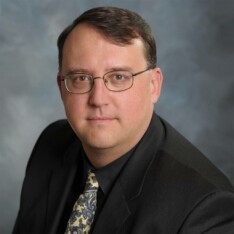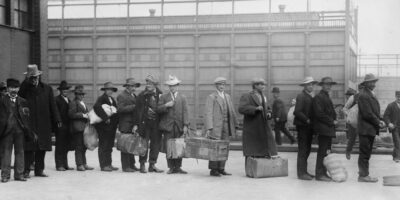The Immigrant Next Door

I was one of almost 100 people to turn out on a cold South Dakota night for a roundtable discussion on immigration hosted by the local chapter of Americans for Prosperity. Aside from the free eats, the discussion was well worth the drive because the event planners took a page out of Arthur Brooks’ books, including his recent Love Your Enemies, by concentrating on real human stories, not theories or statistics.
In fact, only one set of statistics was proffered, recent ones from Cato that showed that immigrants, whether living in America legally or not, are incarcerated at much lower rates than the native-born.
That was an important point to make because some South Dakotans attend church so often (at least twice a week, no joke!) that they seem to think they can act with impunity the rest of the week. As recently as 20 years ago, one issued a faux “hunting license” for American Indians detailed in my Financial Exclusion. Few remain so bigoted but many still harbor harmful stereotypes in their hearts.
So it was with glee that I saw many of those hearts melt when confronted face-to-face with real live immigrants whose personal stories of strength in the face of adversity put the relatively minor trials and travails of almost everyone else in the room to shame.
The same sort of effect can be achieved vicariously, through the study of the immigrants who improved America in the nineteenth century. One worthy project, to which I contributed my mite, is the German Historical Institute’s Immigrant Entrepreneurship website. But those stories can be discounted because the German immigrants had white skin and came when America’s vast midlands needed conquering.
The three immigrants who spoke at the recent AFP event have dark skin and came to America only thirty years ago. Their stories, though, showed that the American Dream is not quite the nightmare some suppose it has become. Those willing to work hard can still achieve their highest potential while pursuing their own routes to happiness.
Alex now runs his own media production company in Sioux Falls. His mother left him in Mexico when he was just three years old. He made it to America at age 17 having never attended a day of school and started a family of his own in California. He hated his three-hour daily commute to PayPal and the hour it took him to get his children to and from school. When he heard that his kids could grow up walking to school and playing outside in South Dakota, his family decided to brave the cold and snow and never looked back.
Barry came to America after graduating from seminary in India in 1984. He is now a bereavement counselor for a local hospice. He first came, though, as a cultural ambassador charged with explaining to Americans how Indians raised as Christians lived and worshipped. He received a lesson in U.S.-style bigotry when the people in his first post, in Lansdale, Pennsylvania (an exurb of Fluffya), told him that most people in Sioux Falls did not have indoor plumbing — in 1985! Well, he found all the modern amenities in South Dakota, and also a wife. It clearly was no marriage of convenience as the couple approaches their thirtieth anniversary. Barry’s family forgave him for marrying for love and for moving to America, so he became a citizen in 1999. He delights telling his family in India that “it is warming up to zero (F) here today!”
William hails from South Sudan and was born and raised in war. Driven into a refugee camp in Kenya in 1991, he made it to Houston, Texas in 1993 but soon moved to Fargo, North Dakota to avoid Houston’s bloodshed, which was too reminiscent of his homeland.
A job at Hutchinson Technologies lured him to South Dakota, where he later worked for Wells Fargo. He is now a minister and travels often to East Africa (but neither of the Sudans) to spread the good news about Jesus. He is convinced that he has helped to reduce the ranks of ISIS though he concedes that he has converted more Americans than Africans to Christianity.
Like the other two immigrants on the roundtable, William helped to raise a brood of youngin’s that have made good. One of his children is an electrical engineer and the other is in medical school.
All three panelists are more American than many Americans. All retain accents but are easier to understand than the denizens of many of our bigger cities, or even Minnysoooota, you betcha. More importantly, all are civically-engaged and say things that make one want to break out into song, specifically Lee Greenwood‘s “Proud to Be an American.”
Alex, for example, is a member of 10 different NGOs, from the local Chamber of Commerce to the Rotary. He picks up garbage he finds on the street and tells the audience of his television show, which is geared toward local Hispanics, that individual responsibility is the key to the good life. He learned that he should not judge others when his new neighbor, who looked like a character out of Sons of Anarchy, snowblowed his sidewalk for him before he owned a shovel, or got a ticket. (Yeah, that’s a thing.)
None of the panelists has ever received welfare and all worked like only those raised in poverty can. William, for example, worked every single day of 1997, even Christmas and Easter, to receive triple pay.
Alex and Barry stayed in America for the opportunity, while William was drawn to its physical security, at least outside of Houston. The American Dream of achieving one’s full potential remains alive, even for Alex’s mother, who toiled in the fields outside Sacramento before settling into a career cleaning hotels, jobs that pay much less, or don’t exist at all, in Mexico.
Interestingly, Barry blames the stereotypes he sometimes still encounters on public education. Some schools still teach Rudyard Kipling stories as if they were factual, while others push cultural identity nonsense. We are all different, he insists, but we all share basic human traits that unite us. The way that people express anguish and grief varies from person to person, and culture to culture, but we all suffer deeply from the loss of loved ones.
While all of the panelists are successful, none are extraordinary. But that was precisely the point. America would still exist if some magical wall had blocked their entrance, but we would all be a little bit worse off had their entrance been denied. That was the unmistakable takeaway from the evening, no Harberger triangles or fancy stats needed.
I would like to see more such events held in communities throughout the country because it is more compelling than canned documentaries when locals, people you might see at Walmart or the movie theater, speak informally about shared locales and experiences.
I would also like to see the local personal storytelling technique, bolstered by a few telling statistics, extended to other policy areas. I know that victims of the carceral state could tell similarly compelling stories. Finding those who understand how they have been hurt by occupational licensing laws, minimum wages, rent controls, interest usury caps, and other economic costs unseen would prove more challenging but not impossible.








